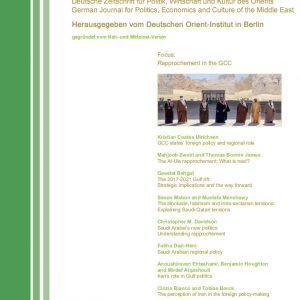Description
The GCC monarchies have been split on Iran. While Saudi Arabia, Bahrain and the UAE tried to curtail Tehran’s regional action, Oman, Kuwait and Qatar took a more balanced posture to hedge the risks of regional instability. A mix of international, regional and domestic factors shaped the two approaches. Among them, the US retrenchment from the Middle East, the Arab Spring and the perception of Iran as an existential or a non-existential threat played a decisive role.
Cinzia Bianco is the Gulf Research Fellow at the European Council on Foreign Relations, based in Berlin, where she is working on political, security and economic developments in the Arabian Peninsula and Gulf region and relations with Europe. Previously, Bianco was a research fellow for the European Commission’s project on EU-GCC relations ‘Sharaka’ between 2013 and 2014. She holds a PhD in Middle East Politics from the University of Exeter in the United Kingdom, where she worked on threat perceptions in the countries of the Gulf Cooperation Council (GCC) after the 2011 Arab uprisings.
Tobias Borck is an Associate Fellow at RUSI, an independent researcher and analyst specialising in Middle East politics and security, and a PhD candidate at the Strategy and Security Institute at the University of Exeter. His doctoral research focuses on stability and regional order in the Middle East from the perspective of the Arab Gulf states. His other research interests include European – specifically German and British – foreign policy towards the Middle East.




Reviews
There are no reviews yet.